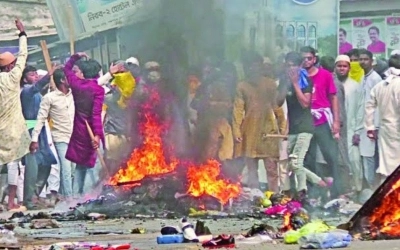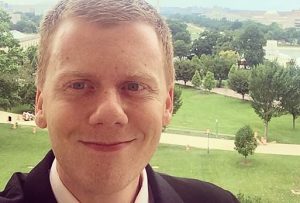

Bangladesh witnessed Pakistan-inspired attacks on Ahmadi Muslims recently (Photo: IANS)
Clifford Smith is Director Washington Project of the Middle East Forum (MEF), where he seeks to inform policy makers in the US about issues like radical Islam, Israel, and Iran, and how they impact America’s national security.
Smith was recently in Udaipur where he spoke about, ‘Understanding Global Propaganda Threats: Manufacturing Narratives and Shaping Perceptions’ at the Maharana Pratap Annual Dialogue on Geopolitics hosted by the think tank Usanas Foundation.
In an exclusive interaction with India Narrative, Smith reveals that the US is slowly beginning to understand the spread of radical islam and how fast the extremist ideologies are spreading across the world. He also talks about how these are likely to impact US policy on terrorism and radicalisation among the masses.


IN: Can you tell us about the work that you are doing to understand radical Islam’s influence in the US?
CS: We seek to understand what different organisations are up to
and how they are perpetuating the ideology, how they are funding themselves and their friends, and how they are seeking to influence US policy. We are also looking into where these organisations come from – both ideologically and geographically.
One of the organisations is the American branch of Jamat-e-Islami (JI) and then we also have the Islamic Circle of North America (ICNA). We are trying to understand how they interact with the Jamatis in India, Pakistan and Bangladesh. We try to understand and answer these questions for US audiences.
IN: How is it that an organisation like the JI, related to Pakistan and Bangladesh, landed up in the US?
CS: The US had relationships with all three countries [India, Pakistan and Bangladesh] and, I will say in retrospect, that there was a lack of understanding about what these organisations were and what they were up to. There were several people involved in the ICNA… for example Ashrafuz Zaman Khan, a Bangladeshi Jamaati who was sentenced to death in absentia for his actions in 1971 was perhaps living in Europe for decades.
I don’t know where he is now but he is believed to be in Pakistan and he was there in the US as well. I believe he was part of an organisation that was trying to shape narratives on India, Bangladesh and Pakistan. However, we don’t think that war criminals should necessarily be informing US policy.
IN: India has been saying for long that it has been facing the scourge of terrorism for many decades but the US and other countries have not paid heed. Now that you are researching the ICNA and JI in the US, is the US beginning to feel that what India was saying has some truth to it?
CS: I would say that the US historically has all kinds of geopolitical, historic and economic reasons for closer ties with the Middle East, and also with Europe. There has been a lack of understanding about South Asia. I think with the rise of China, the US is more concerned about China, it is investing in its relationship with India.
Internally in the US, these issues remain controversial, partly because people do not have deep understanding and partly because of US domestic politics. There is a legitimate concern that we do not want to be unfair to Muslims, prejudiced against Muslims and want them to have the same freedoms as everyone else. But it doesn’t mean accepting that radical form of Islam is the only form of Islam and it doesn’t mean giving licence to terrorists or those who support terrorists.
IN: How is it that after the September 11 attacks, the US did not get a better understanding of terrorism – how terror groups move with ease across countries and also move finances across countries, posing a threat to other countries like Afghanistan and India?
CS: I think it is a real concern. Radical Islamic ideology you can debate when it starts and when it stops. But in some form a theocratic, totalitarian interpretation of Islam attaches itself to the power of a State is actually a relatively new phenomenon.
The Islam that we have seen since Hassan al-Banna, Muslim Brotherhood, Maududi, JI and some others – that is much like communism, much like fascism – is an ideology. It knows no borders. It can spread very easily and that is a problem that I think people know about. At the same time people don’t know how to grapple with it. I think in the US after 9/11, there was much greater awareness of the problem, about which most Americans knew little about.
However, post-9/11 and the wars in Iraq and Afghanistan made this issue very controversial.
Islamist organisations in the US, including Jamati organisations, Muslim Brotherhood and various Salafi Gulf-based groups did a lot to change the narrative. But it is partially domestic American politics and also the controversies which ensued that have polarised… with people thinking we have done too much and others thinking we haven’t done enough to fight this ideology.
People view it as a security concern while others view it as bigotry against Muslims. So, I think for a number of years the issue got ignored.
It is an open question how it is being viewed now. There is still a battle going on. We at the Middle East Forum are trying to bring attention to this issue. Because it doesn’t know boundaries, it doesn’t know borders and it affects India, it affects Afghanistan, it affects Europe and it affects every country in the world where radical ideologies find themselves.
IN: Now that the US has evacuated itself from Afghanistan along with NATO, leaving behind considerable sophisticated weapons, we are witnessing the movement of Taliban guerrillas from Afghanistan to Pakistan. Many Indians are apprehensive that they may set their eyes on India as well. What is the feeling in American counter-terrorism circles?
CS: I think the American counter-terrorism circle is a bit of a misnomer. I believe there are many actors here… but it is just two camps – politicians and experts. The politicians are responsible for the war in Afghanistan and I view it as a policy catastrophe out of which nobody has come out clean. I think it was a huge mistake by the US… I think among the political people there is simply a desire to kind of forget about it, move on and hope nothing happens.
Among experts in the field, there is a legitimate concern about the actual issue – that it will not only be a safe haven for the terrorists but that it will inspire radicals across the world. That it will be used as a club against India. That it will leak radicals to other parts of the world – there is an understanding of that.
That this will change US policies and the policies of its allies, that is something else. We will have to see how that plays out. I am concerned about that. All I can say is that it will get worse before it gets better.
IN: Now that you are beginning to understand the roots and the depth of Islamic organisations, which could be radical organisations or even NGOs, we know that they often overlap. Last year, we had communal riots in Leicester, which were unheard of in the UK. Much of that was imported from Pakistan because of the ideologies of blasphemy, forcible conversions and in looking at minorities as ‘the others’. Do you think American society may face similar issues?
CS: There have been instances of home-grown radicalisation among the Muslims. There was a club shooting and then the shooting incident that involved Tashfeen Malik and her husband in California that killed many people.
Any radical ideology that spreads will cause problems for any country. I am more concerned about the long-term effects of that ideology and what it means for world affairs and how it affects American Muslims, how it affects American foreign policy and how this affects other countries.
IN: Will the spread of radical Islam in the US bring social disharmony among the Americans?
CS: Not yet. Unlike the UK, there are not that many Muslims in the US, maybe just one to two per cent of the population. In that sense I don’t see riots or anything like that happening yet. That said, there is always a danger of that thinking growing, and it is already becoming a partisan and a polarising issue. For example, president Donald Trump said that we need to shut down all immigration for the Muslims, which I thought was wildly over the top, unconstitutional and it unfairly blacklisted decent people.
On the other hand you have people who want to attribute any conceivable slight to Muslims as Islamophobia… and buy into a supremacist narrative. I do think as a political issue it is already polarising and I do not see that changing anytime soon.
Prime Minister Narendra Modi observed a moment of silence to pay tribute to those who…
All India Institute of Medical Sciences, Raipur successfully performed its first Swap Kidney Transplant, also…
Following the deadly terror attack in Pahalgam, tensions between India and Pakistan have further escalated…
An encounter broke out between security forces and terrorists in Jammu and Kashmir's Udhampur district,…
Canadian leaders have strongly condemned the recent terror attack in Pahalgam, Jammu and Kashmir, which…
In the aftermath of the deadly terrorist attack in Pahalgam that killed 26, Michael Rubin,…